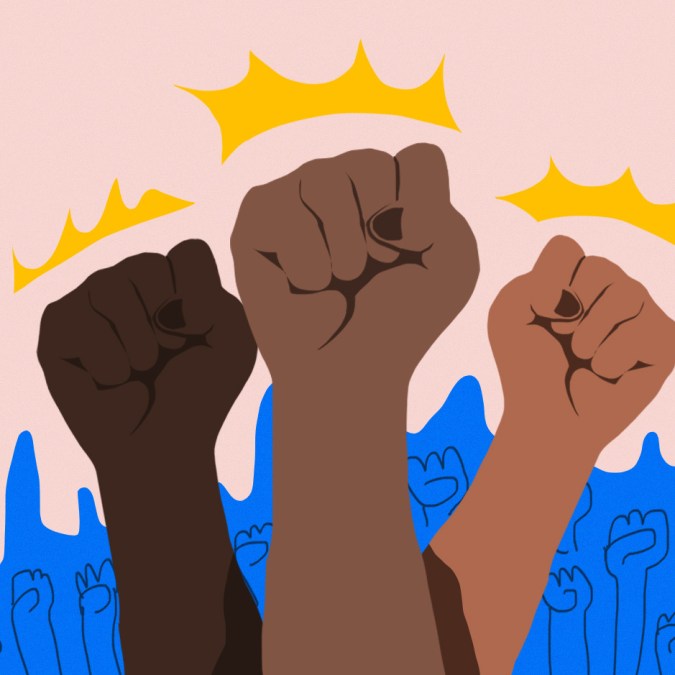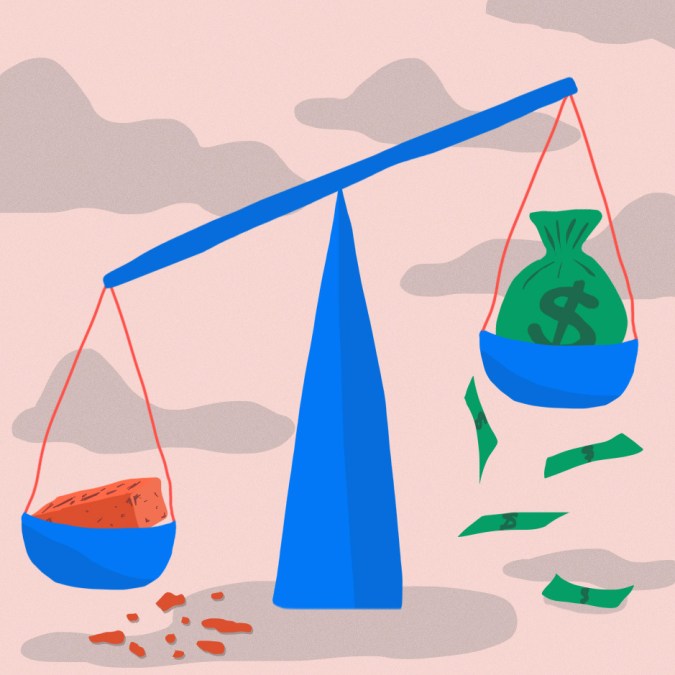The 2020 presidential election has been called the most important of our lifetimes. In fact, the candidates themselves—President Donald Trump and former Vice President Joe Biden—have been clear about the stakes. According to both candidates, the decision voters face on November 3rd is a choice between stability and utter chaos.
The Latine vote has long been called the “Sleeping Giant” in US politics. However, persistently low-turnout has consistently diluted the power of our impact on national politics.
Election after election, we’re framed as single-issue voters… We know that’s not true.
The fault, in many ways, belongs to the political parties themselves. Outreach to Latines from both Republicans and Democrats has been defined by tonterias like Trump’s “I love Hispanics!” taco bowl, Beto’s weird-flex-but-okay “ademas” and, more generally, stereotyping. Election after election, we’re framed as single-issue voters: Specifically, as a community who only cares about immigration. We know that’s not true.
The massive diversity of people with Latin American heritage is too big for even the word “Latinx,” and our political commitments are more dedicated and deep than any single issue. Polling bears this out. In a Pew survey from earlier this year, Latinos ranked the top issues they cared about going into the 2020 election. Immigration? It was sixth on the list.
Latines care about climate change, racial justice, the economy, the Supreme Court and more. If you’re able, and you decide to vote in November, here’s a guide to help you make your decision between the two viable candidates (there are, of course, third party choices, but none of them have a chance to be elected president this year). For some issues, we’ve collected audio from experts and leaders; listen as they speak about what a vote in either direction can mean for our communities.
Black Lives Matter, Racial Equity & Social Justice

One in every four Latines identifies as Black; and the matter of Black Lives needs to be understood central to Latinx politics. Perhaps on no other issue are Trump and Biden more divided.
TRUMP:
While Trump claims to “have done more for Black community than any other president” beside Abraham Lincoln, he has also called BLM a “symbol of hate” and unequivocally opposed the movement. He’s also attributed the fact that police kill Black people at twice the rate as white people to a few “bad apples” in police forces, instead of condemning it as structural racism. Time and time again, Trump defends his record by pointing to the historically low unemployment numbers among Black people prior to the coronavirus pandemic (a claim that, while accurate, highlights a trend that started while Obama was president)
BIDEN:
Biden has praised the most recent Black Lives Matter protests, calling them “a wake-up call for our country.” He’s also acknowledged “systemic racism,” in police departments, and pledged to nominate a Black woman to the Supreme Court. In addition, he has claimed he will “study” providing reparations to the descendants of enslaved Africans brought to the U.S. However, critics have called attention to his opposition of busing—one of the primary ways of undoing racial segregation in schools—in the 1970s, and his support of the 1994 crime bill which contributed to the mass incarceration of Black men.
The COVID-19 Pandemic

Black and non-Black Latino communities have been the most seriously affected by the coronavirus pandemic, with Black and non-Black Latines getting sick and dying at twice the rate as white people. Latines are also over-represented among essential workers (nurses, grocery stores staff, farmworkers, etc.)
TRUMP:
Trump’s strategy to deal with the virus is… the one you’re currently seeing. Although he signed an economic relief bill in the summer, he recently announced that he would refuse to negotiate another relief bill with Democrats in Congress until after the election. In other words, no more relief checks are coming, and unemployment benefits won’t get federal help, at least until after November 3rd. Trump has also largely opposed shutdowns and has belittled mask-wearing and other safety measures advocated by medical experts. He’s withdrawn the U.S. from the World Health Organization (WHO), too.
BIDEN:
Biden has proposed a more aggressive strategy, including a national mandate that demands all people wear masks while in public. He’s also said he’ll re-join the WHO. Biden and Trump both agree that schools should re-open even during the pandemic and that vaccine research should be fast-tracked. But, unlike Trump, Biden has advocated for extending unemployment benefits.
The Economy & Economic Inequality

According to the Pew poll from earlier this year, the economy is the single most important issue to Latinx respondents going into the 2020 election.
TRUMP:
Until March, the economy was by far the strongest part of Trump’s re-election chances. Employment and economic growth were at all-time highs—a fact for which Trump takes credit. (Many economists attribute the economic growth under Trump to a continuation of trends that began with President Barack Obama). Then came March 2020: The economy has since imploded, and the pandemic has been defined by unprecedented unemployment. Going forward, Trump plans on defending—and perhaps increasing—his historically large tax cut. The vast majority of the 2017 GOP tax cut went to large corporations, but most individuals did see their personal savings increase.
BIDEN:
Biden has promised to prevent cuts to Social Security and expand benefits. He has said he would reverse Trump’s 2017—specifically by targeting large corporations while keeping taxes the same for anyone earning less than $400,000. By raising the corporate tax rate and increasing capital gains taxes, Biden says he’ll fund increased government spending on combating climate change and improving access to health-care and education.
CALL AN EXPERT: Jackie Fielder is a candidate running for the California state senate the district that encompasses San Francisco. A Native and Latina woman, Fielder’s major success fighting for economic and social equality was the creation of the country’s first municipal bank in San Francisco, which Fielder says is a way for the community’s money to fund the community itself, rather than enrich fat-cat bank owners. Looking to the 2020 presidential election, Fielder says the major difference between Trump and Biden is not actually their policies but rather the space and power that activists will have to push for under their respective administrations.
Immigration and Asylum:

About half of all immigrants in the United States come from Latin America, and many Latines—including those born in the U.S.—have family in other countries. There are also ongoing refugee and displacement crises in Central America, Haiti and Venezuela. The 2020 election will have a dramatic effect on U.S. immigration and asylum policy.
TRUMP:
Under the Trump administration, with a push led by the anti-immigration zealot Stephen Miller, the U.S. has pursued the most restrictive immigration policies since the early 1960s—when full-ass race-based immigration bans were still a thing. (Before the Civil Rights Act was passed in 1964, it was legal for Congress to pass laws banning immigration based on race, like the Chinese Exclusion Act in 1882). The administration has also used the pandemic as an opportunity to end—like end—asylum on the border. Refugees fleeing from even the most horrific scenarios in places like El Salvador and Venezuela are being immediately deported back into Mexico, no questions asked. And, while family separation is no longer administration policy, children and families are still spending weeks, and even months, in detention centers. The “Remain in Mexico” plan (the Migrant Protection Protocols) has also led to countless asylum seekers facing robbery, rape, homelessness, and murder in northern Mexico. If re-elected, Trump will continue his administration’s push to essentially end the US refugee program, and further constrict legal immigration.
BIDEN:
If elected, Biden has promised to “immediately end” Trump’s attack on immigration and asylum (though experts say it’d be hard for him to undo Trump’s massive policy changes quickly). The Obama-Biden administration deported everyone and their grandma—more people, deported at a faster rate, than any other administration in history, including Trump. But Biden has said that was a “big mistake,” and has promised a moratorium on deportations during his first 100 days in office. “There will not be another foot of [border] wall constructed on my administration,” he said. Biden has, notably, not called explicitly for an end to the U.S.’ practice of keeping migrant children and families in detention centers.
Foreign Policy

In the general election, questions of foreign policy have focused on Russian interference in US elections and policy towards China. Of course, US foreign policy in the Americas has a dramatic effect on our families in Latin America, as well as on immigration to the US.
TRUMP:
In 2019, Trump cut $450 million in aid to Guatemala, El Salvador and Honduras in order to pressure the governments of those countries to stop both migrants and asylum seekers from leaving their border. In June of this year, apparently satisfied with the three Central American government’s massive crackdown on human movement, he returned some of the aid. Trump recognizes Juan Guiadó as the leader of Venezuela and supported the controversial deposition of Hugo Chávez in Bolivia. He’s against US-Cuban relations.
BIDEN:
Biden supports increasing aid to Central America to address the “root causes of migration”; however, most of that money will likely be earmarked for security forces and anti-drug operations, as it was under the Obama administration. It could possibly empower repressive police and military forces in Central America. Biden has said the US “should not be in the business of regime change,” but says Maduro is a dictator; he’s called for free elections in Venezuela. He would also give Venezuelans currently in the US Temporary Protected Status. He supports diplomacy open dialogue with the Cuban government.
CALL AN EXPERT: Roberto Lovato is a Salvadoran American journalist and scholar. His book, Unforgetting, is a memoir built around when he left his home of San Francisco to fight in the Salvadoran Civil War against the far-right government in 1990. He’s reported from Mexico, El Salvador, Haiti, the Dominican Republic, Venezuela and elsewhere. As an expert on US foreign policy in the Americas, Lovato says that U.S. policy towards Latin America will be basically the same under either Trump or Biden—exploitive and dominating. The main difference will be in how each speaks of Latin America.
Climate Change

When it comes to climate change, Latines seem to find the issue much more important than the average person in the U.S. does—namely, 60% of Latines say climate change is “very important to them,” compared to 40% of U.S. adults in the general population. The effects of climate change are already intensifying fires in California and hurricanes over Florida. It’s also led to increased migration across the world—for instance, in Huehuetenango (in the Guatemalan highlands) historic drought has forced thousands to migrate north.
TRUMP:
Despite some vague comments to the contrary, Trump has denied the scientific reality of climate change. He withdrew the U.S. from the Paris climate ingredient and has hollowed out many of the environmental protections Obama created, like tighter emission and pollution standards. He has also promoted fossil fuel consumption, in particular coal.
BIDEN:
The former vice president wants the government to take greater action on climate change; while he does not support the Green New Deal or a change and investment of that size (an ~$10-90 trillion investment), he has proposed spending $2 trillion to fight climate change. He also supports decreasing the country’s reliance on fossil fuels.
Drug Policy

In the midst of the COVID-19 pandemic, there is another ongoing public health crisis: The overdose epidemic. The legalization—or decriminalization—of marijuana is also an important debate to many Latines, and our community is divided: First-generation Latines generally oppose legalization, while the clear majority of U.S.-born Latines support legalization.
TRUMP:
Trump has funneled money towards the opioid crisis, but overdoses still reached a record high in 2019 (after dipping the year before). His support for ending the Affordable Care Act—aka Obamacare—could mean millions of people working to overcome addiction might not be able to pay for treatment. A large part of his drug policy is calling for building a wall between the U.S. and Mexico to stop drugs… somehow. He is also (surprise!) against the legalization of marijuana.
BIDEN:
Joe Biden has proposed investing an ambitious $125 million into combating the opioid epidemic, with an emphasis on treatment centers and treating the epidemic as a disease, rather than as a criminal issue. He wants to extend Obamacare. He also supports the decriminalization of marijuana—so that people can’t go to prison for simple possession—but he doesn’t want to legalize it.
EXPERT INPUT: Magdalena Cerdá is an associate professor at New York University, in the Department of Public Health. She’s completed research in both the United States and Latin America and is an expert in public health methods to combat addiction and overdose. She explains that one of the most important ways of dealing with the addiction epidemic is actually successfully fighting the coronavirus pandemic.
Abortion

When it comes to abortion, Latines have complex attitudes. Many who support restricting abortion (many of them Catholic) nonetheless frequently support politicians who endorse a person’s right to choose.
TRUMP:
Before his presidency, in his reality TV days, Trump spoke strongly in favor of abortion. Since becoming the leader of the Republican party, he’s changed his tune. Specifically, he’s thrown his weight behind bills that seek to restrict when pregnant people can get an abortion. He also has officially nominated Amy Coney Barrett to the Supreme Court, which could tilt the majority of justices in favor of rolling back and maybe even repealing Roe v Wade, the court case that protects abortion rights.
BIDEN:
Biden is a weird opposite of Trump. While he’s spoken about how he opposes abortion as a private, Catholic, individual, he says that as a politician he supports a person’s right to choose. He does not believe in any additional abortion restrictions and has gone as far as to say that people receiving government aid should be able to use that money for medical procedures like abortion.
Gun Policy

Latines are twice as likely to die by gun violence as non-Latinx white people. According to the Pew Research Center poll, gun policy is one of the most important issues to Latine voters.
TRUMP:
Trump stands strongly in favor of no additional restrictions or qualifications for gun ownership. He’s been pretty flojo about whether or not he supports background checks but it seems like he doesn’t. He supports banning “bump-stucks,” the thing the Las Vegas shooter used to make his rifle shoot rapid-fire.
BIDEN:
Biden supports a ban on assault weapons and a mandatory background check for all gun purchases. He also supports the owners of assault rifles either selling their gun to the government or especially registering it. He also supports banning bump stocks. That’s pretty much it. He hasn’t pushed for any more restrictions.
Policing and the Criminal Justice System

Latines are arrested by police at higher rates, especially if they’re Black. The “War on Drugs” has devastated our communities across the U.S. and Latin America.
TRUMP:
Trump has been outspoken in his support of the cops. He strongly advocates for continuing “qualified immunity”—the sorts of legal protections that stop cops from being charged with a crime when they kill people, like Breonna Taylor.
BIDEN:
Biden is strongly against defunding the police. He hasn’t called for an end to qualified immunity, but he has called for reform.
LGBTQ+ Rights

At least one in five Latines identifies as queer, and Latine millennials are actually more likely to identify as queer than any other millennial group.
TRUMP:
Over the last few years, Trump has rolled back historic protections for trans people and other communities, and he issued a ban on trans people from serving in the military.
BIDEN:
Biden wants to undo Trump’s ban on trans people serving in the military. He’s also unveiled a plan to expand the government’s protection of LGBTQ+ rights, including extending civil rights protections to sexual and gender minorities.




